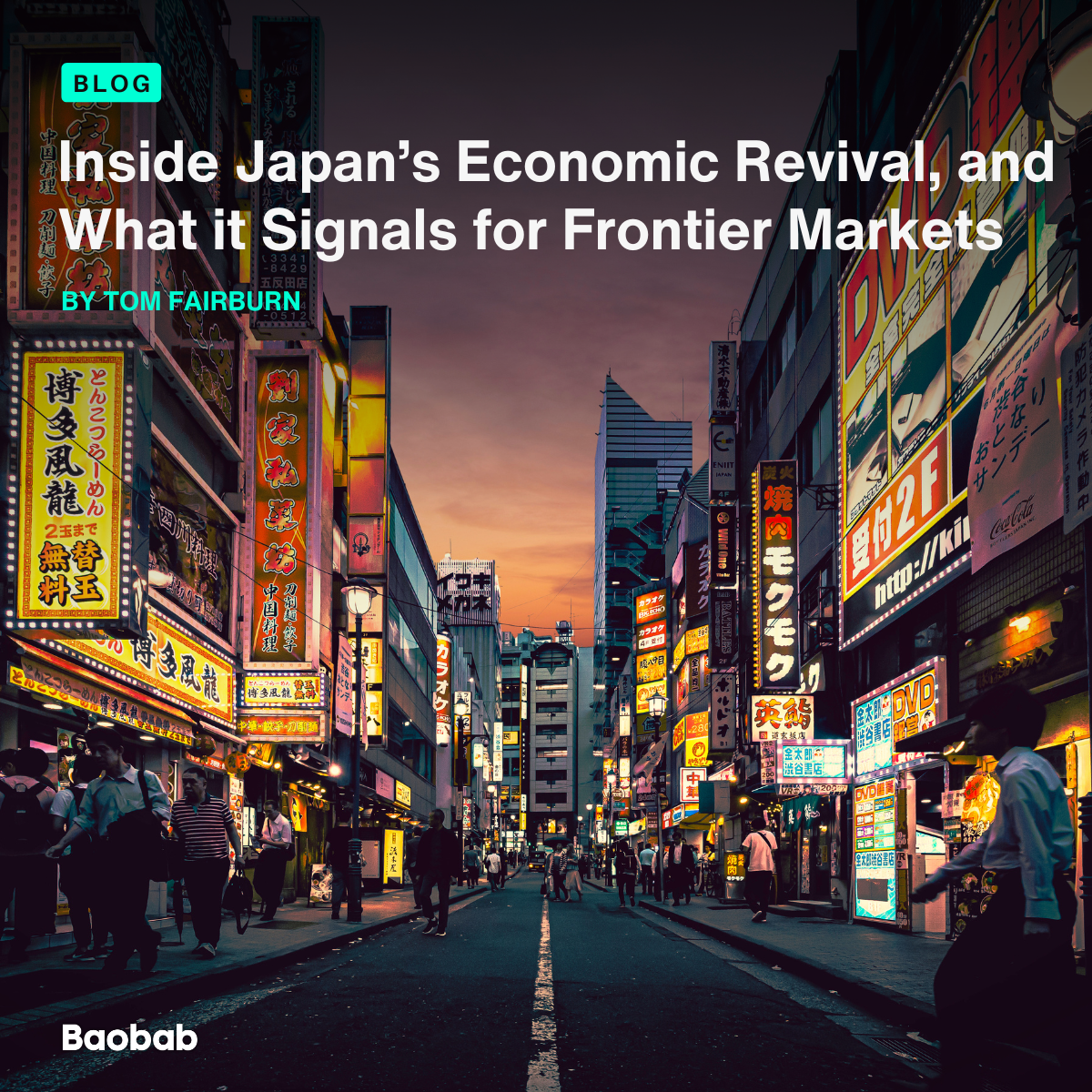Japan’s Economic Revival and What It Means for Frontier Markets
Japan’s economic reawakening is sparking fresh conversations about growth, risk, and opportunity, with Africa now firmly part of the dialogue.
Earlier this year, I spent a week in Japan meeting institutional investors and attending the AVCJ conference in Tokyo. The trip offered a valuable window into how global allocators are thinking about opportunity across both developed and emerging markets.
From Tokyo boardrooms to investor roundtables, the conversations carried a mix of optimism, realism, and recalibration; a reflection of how capital is repositioning in an increasingly multipolar world.
Below are a few reflections from my time there.
1. Japan’s Reawakening
After decades of low growth and deflation, Japan’s economy is showing renewed vitality. Corporate governance reforms are driving more transparency and accountability, while a weaker Yen continues to benefit exporters and attract foreign capital.
The sentiment among investors is one of cautious optimism — an acknowledgment that Japan’s fundamentals are strong and that its time on the sidelines may be coming to an end.
It’s telling that Warren Buffett recently increased his stakes in Japan’s trading houses, citing confidence in their global reach and disciplined management. For many, that’s the ultimate signal that Japan’s economy is once again open for business.
2. A Safe Harbour for Global Capital
With interest rates remaining near historic lows, Japan stands out as a relative safe haven in a world where capital is getting more expensive.
Institutional investors are increasingly viewing Japan as a destination for stable yield and predictable performance. A counterbalance to the volatility seen in other major markets.
This positioning gives Japan a unique role in the global capital ecosystem: a market that combines liquidity, discipline, and long-term perspective.
3. A Rising Focus on India
Conversations about India were consistent and enthusiastic. Investors are watching the country’s growth trajectory closely. From its expanding digital infrastructure to its young, tech-enabled consumer base.
For Japanese institutions in particular, India represents both diversification and proximity. Several allocators spoke about increasing exposure either directly or through regional funds.
The broader narrative is clear: India has become central to Asia’s growth story, and investors are looking for smart, strategic ways to participate.
4. The Africa Conversation Is Gaining Ground
What stood out most for me, however, was how often Africa entered the discussion.
While still early compared to interest in India or Southeast Asia, investors are becoming more curious (and better informed) about the continent’s potential.
Themes that resonated included:
- The strength of fintech, logistics, and infrastructure plays;
- Opportunities for venture exposure through pan-African or thematic funds; and
- Africa’s long-term demographic and urbanisation story, which stands in stark contrast to Japan’s ageing population.
Japan’s development finance institutions are already active in several African markets, and the appetite for risk-adjusted exposure to the Continent is clearly growing.
5. The Macro Mood: Guarded Optimism
If there’s one phrase that captured the tone of the week, it’s guarded optimism.
Global investors are navigating shifting supply chains, capital rotation from West to East, and an ongoing realignment around energy security and inflation resilience.
Japan, with its geopolitical neutrality and disciplined economic management, is seen as a stabiliser, a steady anchor in an uncertain global environment.
6. Rethinking Frontier Markets
For those of us focused on frontier and emerging markets, Japan offers both capital and perspective.
It was evident that investors are rethinking how they define risk and return in a world that feels increasingly unpredictable. Africa and India, once viewed as peripheral, are now part of that recalibration; not just as emerging opportunities, but as essential components of a diversified global thesis.
Looking Ahead
At Baobab, we’ve always believed that the story of innovation and growth is global, but the next wave will be driven by regions that have long been underestimated.
My time in Japan reinforced that belief. The conversations were thoughtful, the curiosity genuine, and the willingness to learn about Africa’s growth story stronger than ever.
As Japan continues its economic revival, and as Africa continues to rise, the intersection between the two offers real potential — grounded in shared principles of discipline, resilience, and long-term vision.



